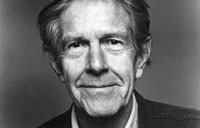Avant-garde music pioneer John Cage (1912-1992), widely recognized as the one of the most influential American composers of the 20th century, would have turned 100 during this current academic year. The Faculty of Fine Arts celebrates this centenary with CageSpace, a “musicircus” conceived and coordinated by music Professor Casey Sokol, featuring an eclectic range of performances in homage to John Cage. The event takes place in the Accolade East Building  Thursday, Feb. 7 from 3 to 7pm.
Thursday, Feb. 7 from 3 to 7pm.
John Cage
“All the performed music in the world arises in part from intentionally-directed imagination and controlled, cultivated action, but it inevitably also incorporates a degree of uncertainty, a certain level of contingency, accident and serendipity,” said Sokol, who knew Cage and is a longstanding champion of his music. “After a substantive encounter with Buddhist ideas and practices, Cage became deeply interested in the unknowns and uncertainties of musical composition and performance and, consequently, in the capacity to attend to events as they are — that is, without presupposing or imposing context or definition, or situating the performance anywhere other than the present moment.”
Typically, event producers aim to control as many aspects and deliver as close to the intended artistic vision as possible. Sokol, himself a well-known musical explorer and improviser, approached CageSpace with the opposite in mind. How wide could the artistic vision be? How unconstrained the performances, how little could be scheduled and defined? How many artists could be involved, and how could they all be kept open to the idea of serendipity, the “happy accident” in performance?
CageSpace will be a moveable feast, playing out in the CIBC Lobby and a variety of other spaces in the Accolade East Building.
The York Dance Ensemble will perform a large-scale work set to live music and based on graphics and notions of indeterminacy, choreographed by its artistic director, Professor Holly Small. Music alumnus Dave McKevy (BFA ‘93) will install a one-person Listening Chamber where, surrounded by speakers in a darkened space, one does absolutely nothing but listen. And Campbell Foster (BFA ’84) will turn the coatcheck area into an electro-acoustic and computational feedback synthesis piece where visitors are invited to “play” the metal gate.
Performances in the Tribute Communities Recital Hall (3-4:30pm) include Professor Christina Petrowska Quilico’s rendition of Cheap Imitation, a work for solo piano by Cage, and Sokol’s performance of French composer Erik Satie’s Entre’acte, a live score accompanying a screening of the 1924 dada film of the same title. Music alumnus and current master’s candidate Andrew Timar (BA ’11) will present his own compositions Ozone Layer and J.O.H.N. C.A.G.E. (26.8.1979), scored for any nature and number of instruments and/or voices.
Other performers and contributors include York’s New Music Ensemble directed by faculty member and graduate student Matt Brubeck; Professors Mark Chambers and William Thomas leading the York University Symphony Orchestra and the York University Wind Symphony in a performance of Atlas Eclipticalis; and alumni John Oswald (BFA ’77) and Gayle Young (BFA ’77).
“Cage’s influence on our culture runs much deeper and wider than his music alone,” said Sokol. “CageSpace is filled with what we feel is still streaming through the wake of his enormously provocative creativity and spiritual sensibility. We will do what we do best and make a party out of it: a musicircus!”



